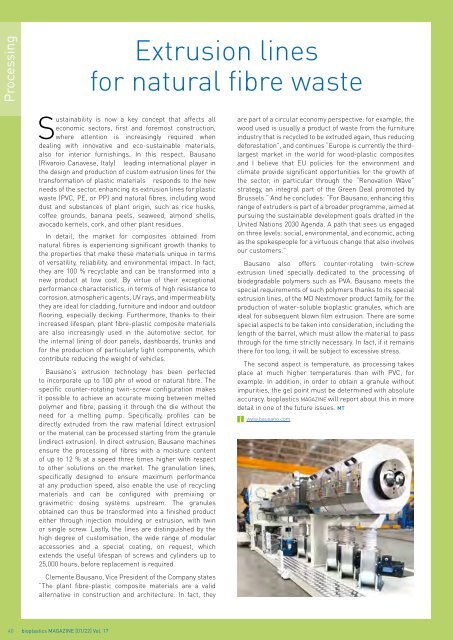issue 01/2022
Highlights: Automotive Foam Basics: Biodegradation
Highlights:
Automotive
Foam
Basics: Biodegradation
You also want an ePaper? Increase the reach of your titles
YUMPU automatically turns print PDFs into web optimized ePapers that Google loves.
Processing<br />
Extrusion lines<br />
for natural fibre waste<br />
Sustainability is now a key concept that affects all<br />
economic sectors, first and foremost construction,<br />
where attention is increasingly required when<br />
dealing with innovative and eco-sustainable materials,<br />
also for interior furnishings. In this respect, Bausano<br />
(Rivaroio Canavese, Italy) leading international player in<br />
the design and production of custom extrusion lines for the<br />
transformation of plastic materials responds to the new<br />
needs of the sector, enhancing its extrusion lines for plastic<br />
waste (PVC, PE, or PP) and natural fibres, including wood<br />
dust and substances of plant origin, such as rice husks,<br />
coffee grounds, banana peels, seaweed, almond shells,<br />
avocado kernels, cork, and other plant residues.<br />
In detail, the market for composites obtained from<br />
natural fibres is experiencing significant growth thanks to<br />
the properties that make these materials unique in terms<br />
of versatility, reliability, and environmental impact. In fact,<br />
they are 100 % recyclable and can be transformed into a<br />
new product at low cost. By virtue of their exceptional<br />
performance characteristics, in terms of high resistance to<br />
corrosion, atmospheric agents, UV rays, and impermeability,<br />
they are ideal for cladding, furniture and indoor and outdoor<br />
flooring, especially decking. Furthermore, thanks to their<br />
increased lifespan, plant fibre-plastic composite materials<br />
are also increasingly used in the automotive sector, for<br />
the internal lining of door panels, dashboards, trunks and<br />
for the production of particularly light components, which<br />
contribute reducing the weight of vehicles.<br />
Bausano’s extrusion technology has been perfected<br />
to incorporate up to 100 phr of wood or natural fibre. The<br />
specific counter-rotating twin-screw configuration makes<br />
it possible to achieve an accurate mixing between melted<br />
polymer and fibre, passing it through the die without the<br />
need for a melting pump. Specifically, profiles can be<br />
directly extruded from the raw material (direct extrusion)<br />
or the material can be processed starting from the granule<br />
(indirect extrusion). In direct extrusion, Bausano machines<br />
ensure the processing of fibres with a moisture content<br />
of up to 12 % at a speed three times higher with respect<br />
to other solutions on the market. The granulation lines,<br />
specifically designed to ensure maximum performance<br />
at any production speed, also enable the use of recycling<br />
materials and can be configured with premixing or<br />
gravimetric dosing systems upstream. The granules<br />
obtained can thus be transformed into a finished product<br />
either through injection moulding or extrusion, with twin<br />
or single screw. Lastly, the lines are distinguished by the<br />
high degree of customisation, the wide range of modular<br />
accessories and a special coating, on request, which<br />
extends the useful lifespan of screws and cylinders up to<br />
25,000 hours, before replacement is required.<br />
Clemente Bausano, Vice President of the Company states<br />
“The plant fibre-plastic composite materials are a valid<br />
alternative in construction and architecture. In fact, they<br />
are part of a circular economy perspective: for example, the<br />
wood used is usually a product of waste from the furniture<br />
industry that is recycled to be extruded again, thus reducing<br />
deforestation”, and continues “Europe is currently the thirdlargest<br />
market in the world for wood-plastic composites<br />
and I believe that EU policies for the environment and<br />
climate provide significant opportunities for the growth of<br />
the sector, in particular through the “Renovation Wave”<br />
strategy, an integral part of the Green Deal promoted by<br />
Brussels.” And he concludes: “For Bausano, enhancing this<br />
range of extruders is part of a broader programme, aimed at<br />
pursuing the sustainable development goals drafted in the<br />
United Nations 2030 Agenda. A path that sees us engaged<br />
on three levels: social, environmental, and economic, acting<br />
as the spokespeople for a virtuous change that also involves<br />
our customers.”<br />
Bausano also offers counter-rotating twin-screw<br />
extrusion lined specially dedicated to the processing of<br />
biodegradable polymers such as PVA. Bausano meets the<br />
special requirements of such polymers thanks to its special<br />
extrusion lines, of the MD Nextmover product family, for the<br />
production of water-soluble bioplastic granules, which are<br />
ideal for subsequent blown film extrusion. There are some<br />
special aspects to be taken into consideration, including the<br />
length of the barrel, which must allow the material to pass<br />
through for the time strictly necessary. In fact, if it remains<br />
there for too long, it will be subject to excessive stress.<br />
The second aspect is temperature, as processing takes<br />
place at much higher temperatures than with PVC, for<br />
example. In addition, in order to obtain a granule without<br />
impurities, the gel point must be determined with absolute<br />
accuracy. bioplastics MAGAZINE will report about this in more<br />
detail in one of the future <strong>issue</strong>s. MT<br />
www.bausano.com<br />
40 bioplastics MAGAZINE [<strong>01</strong>/22] Vol. 17

















